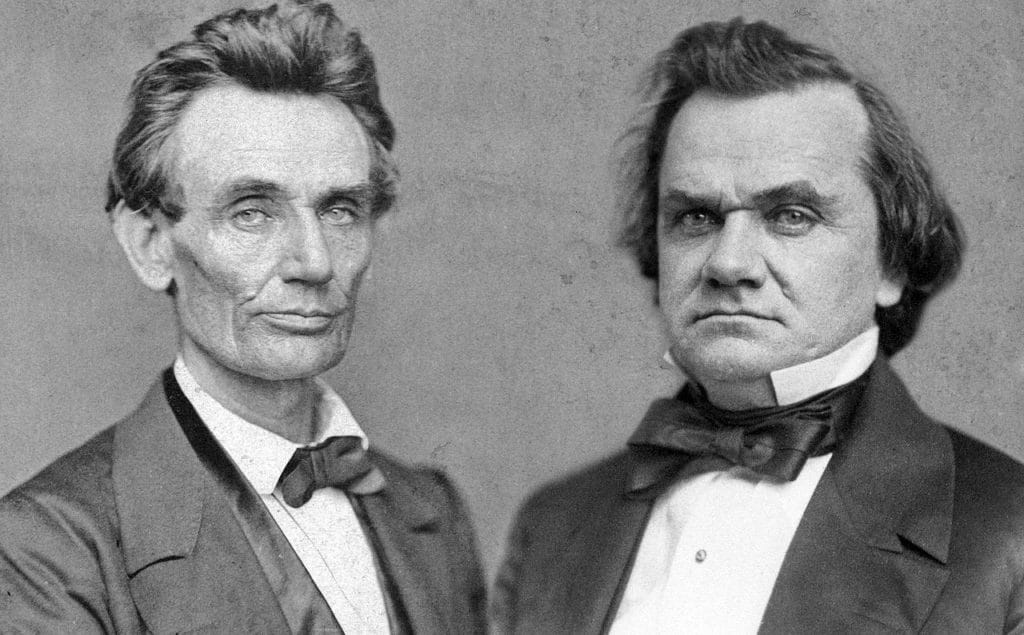The Lincoln-Douglas debates were a series of debates between Abraham Lincoln and Stephen Douglas during the Illinois Senate race of 1858. The debates would become infamous and raise awareness of the issue of slavery across the North.

Lincoln-Douglas Debates: Organization and Background
During the 1858 Senate elections, the Republican Candidate, Abraham Lincoln, and the Democratic Candidate, Stephen Douglas, agreed to do one debate in the nine congressional districts of Illinois. Due to already speaking in two of the districts, they decided to only debate in seven districts. The debates were held at the following:
- Ottawa on August 21
- Freeport on August 27
- Jonesboro on September 15
- Charleston on September 18
- Galesburg on October 7
- Quincy on October 13
- Alton, on October 15
Background
The Country was divided over the issue of slavery. The Compromise of 1850, the Dred Scott Case, Popular Sovereignty, and the Kansas-Nebraska Act was the issues that caused much division.
In 1858, Stephen Douglas was seeking election for a third term against the newly formed (and gaining momentum) Republican party.
Douglas's approach to slavery was popular sovereignty, which was a middle ground.
Abraham Lincoln was seeking election into the Senate and ran on an anti-slavery ticket. His approach was emancipation, but he admitted that he did not know how to go about that.
Before the debates, Lincoln said that Douglas was encouraging his fears of amalgamation of the races with enough success to drive thousands of people away from the Republican Party.
Douglas tried to convince, especially the Democrats that Lincoln was an abolitionist for saying that the American Declaration of Independence did apply to blacks as well as whites.
Lincoln called a self-evident truth "the electric cord ... that links the hearts of patriotic and liberty-loving men together" of different ethnic backgrounds.
Lincoln argued in his House Divided Speech that Douglas was part of a conspiracy to nationalize slavery.
Lincoln said that ending the Missouri Compromise ban on slavery in Kansas and Nebraska was the first step in this direction and that the Dred Scott decision was another step in the direction of spreading slavery into Northern territories. Lincoln expressed the fear that the next Dred Scott decision would make Illinois a slave state.
Both Lincoln and Douglas had opposition. Although Lincoln was a former Whig, the prominent former Whig Judge Theophilus Lyle Dickey said that Lincoln was too closely tied to the abolitionists and supported Douglas.
Democratic President James Buchanan opposed Douglas for defeating the Lecompton Constitution, which would have made Kansas a slave state, and set up a rival National Democratic party that drew votes away from him.
The Debates
The main topic of the Lincoln-Douglas debates was slavery, specifically the expansion of slavery.
Douglas was required to defend his Kansas-Nebraska Act, that repealed the Missouri Compromise and replaced it with popular sovereignty.
Douglas argued that his legislation was supported by both Democrats and Whigs, while Lincoln rebutted, saying that the national policy was to limit slavery, citing the Northwest Ordinance of 1787.
The debates were covered by national media and seen by residents of other states.
Stephen Douglas continued to argue that Abraham Lincoln was an abolitionist.
Abraham Lincoln argued that Stephen Douglas wanted the expansion of slavery, even arguing that his legislation could endanger the state of Illinois' status as a free state.
Stephen Douglas went on to win the election, but the debates brought national recognition to Abraham Lincoln that would propel him to the Presidency in 1860.
These debates would also further divide Lincoln from the South.
Related Pages
- Wikipedia - Lincoln-Douglas Debates
- The History Junkie’s Guide to the Civil War
- The History Junkie’s Timeline of the Civil War
- The History Junkie’s Timeline of American History
- The History Junkie’s Guide to Colonial America
- The History Junkie’s Guide to the Revolutionary War
- Slavery during the American Revolution
- Return to The History Junkie's Homepage
